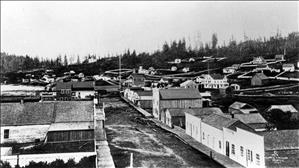On January 14, 1865, the Territory of Washington Legislature incorporates the Town of Seattle for the first time, adopting a city charter that puts the municipal government in the hands of a board of five trustees, to be elected annually. The Legislature defines the city limits as encompassing an area from Howell Street on the north to Atlantic Street on the South, and from Elliott Bay on the west to 24th Avenue S on the east.
The charter stipulated that the trustees were to appoint a town clerk, a marshal, and a magistrate. Of these, the marshal was the only salaried official, receiving $300 per year.
The trustees met for the first time on January 28, 1865. Charles C. Terry (1829-1867) was elected president of the board. Other members were Henry L. Yesler (1810-1892), Hiram Burnett, David T. Denny (1832-1903), and Charles Plummer (d. 1866).
Over the next two years, the trustees adopted a total of 14 ordinances, beginning with one that implemented a municipal tax (possibly a source of resentment that led to the eventual dissolution of Seattle's first municipal government). The second ordinance, titled "Concerning Swine," marked the beginning of police regulation in Seattle. A third provided for the "Prevention of Drunkenness and Disorderly Conduct." The trustees also passed an ordinance calling for the removal of Indians to points outside the town limits and providing for the punishment of those who might harbor them. Another law was aimed at preventing "Reckless and Fast Driving Through the Streets."
The Territorial Legislature disincorporated Seattle on January 18, 1867, after most of the town's leading citizens filed a petition for dissolution. Seattle once again became a precinct of King County. In the latter part of 1869, the citizens asked the Legislature for another municipal government, with a mayor and town council instead of a board of trustees. The Legislature reincorporated Seattle, on December 2, 1869, issuing a new town charter that provided for a "more pretentious" system of government (Bagley, 546).

